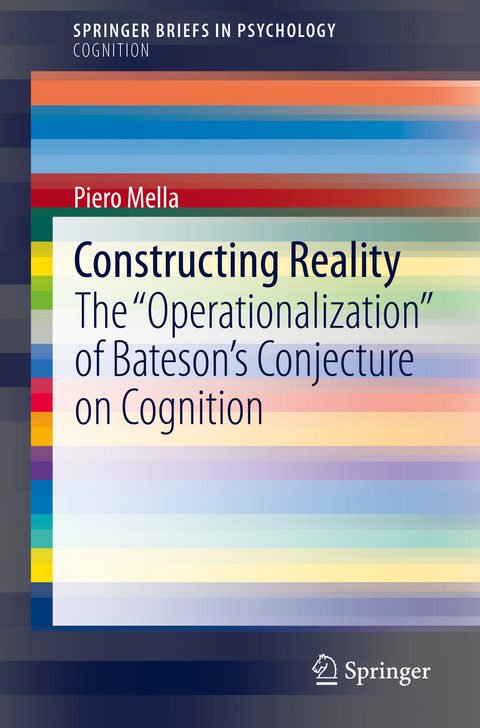
Constructing Reality
Springer International Publishing (Verlag)
978-3-030-44131-9 (ISBN)
This brief presents an overview of Gregory Bateson's Constructivist method of Cognition. Bateson proposes a theory of cognition that is based on the abstract notion of difference that the mind distinguishes and perceives and represents information that constitutes and separates how different states are ordered, grouped, and classified. Bateson, however, does not clearly indicate how a cognitive system can develop a knowledge of reality from the perception of these differences. This book seeks to offer a scientific approach to Constructivism. Using Bateson's hypothesis, chapters discuss how our mind distinguishes and elaborates differences, allowing us to form perceptions of objects, and how these objects can be described and compared. Chapters also discuss how from differences, it is possible to construct concepts or ideas of how these can be defined and how to derive from these differences the meanings of the signs used for the structuring of languages. The brief offers a coherent structure of propositions that form an interpretative theory of the modus operandi of the human mind, which will be useful not only in shedding light on our cognitive processes, but also in laying the formal groundwork for artificial intelligence.
Constructing Reality is a must-have resource for researchers and students of the cognitive sciences, as well as education sciences, and researchers and scholars of artificial intelligence, learning theory, and intelligent automata programming.
Piero Mella is Full Professor of Business Economics and Control Theory at the Faculty of Economics, University of Pavia. In the past he has been the Dean of the Faculty as well as the Director of its Department of Business Research. He has authored dozens of publications (among which a treatise entitled Amministrazione d'Impresa [Management of the Firm], UTET Press), and for years he has researched systems theory from multiple perspectives. His recent essays about Systems theory include: Guida al Systems Thinking [A Guide to Systems Thinking] (Il Sole24Ore, Milano, 2007) and Sistemi di controllo [Control Systems] (Franco Angeli, Milano, 2008), and Systems Thinking: Intelligence in Action (2012). He has developed the Theory of Combinatory Systems; he is editor of the journal "Economia Aziendale on-line".
Chapter 1. Bateson's Model of the Mind and the Fundamental Conjecture on Cognition.- Chapter 2. Beginning the Operationalization Process. First Step: Descriptions. From Dimensions to Objects.- Chapter 3. Second Step: Definition. From Objects to Concepts.- Chapter 4. Communication. Signs and Languages.
| Erscheinungsdatum | 12.06.2020 |
|---|---|
| Reihe/Serie | SpringerBriefs in Cognition | SpringerBriefs in Psychology |
| Zusatzinfo | XVII, 103 p. 28 illus., 23 illus. in color. |
| Verlagsort | Cham |
| Sprache | englisch |
| Maße | 155 x 235 mm |
| Gewicht | 201 g |
| Themenwelt | Geisteswissenschaften ► Psychologie ► Allgemeine Psychologie |
| Schlagworte | Artifical Intelligence • Bateson's theory of knowledge • Bateson’s theory of knowledge • Cognition • control systems • intelligent automata programming • Learning theory • signs and meaning |
| ISBN-10 | 3-030-44131-8 / 3030441318 |
| ISBN-13 | 978-3-030-44131-9 / 9783030441319 |
| Zustand | Neuware |
| Haben Sie eine Frage zum Produkt? |
aus dem Bereich


